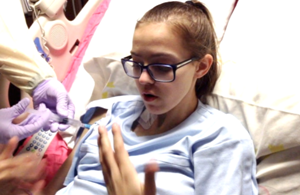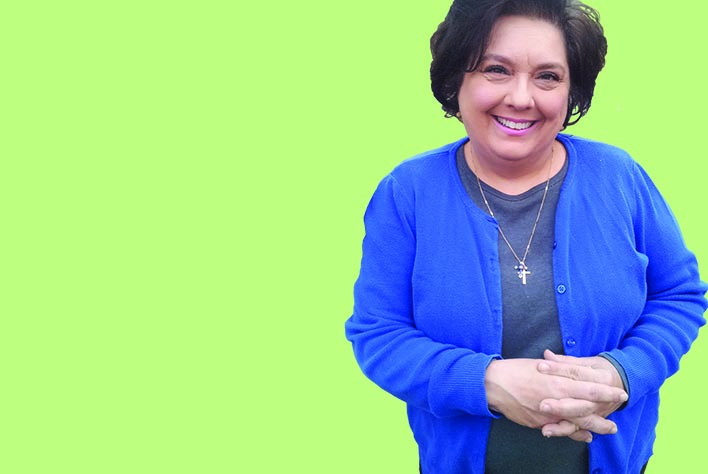Her daughter’s illness led Donna Yadrich to create clothes that comfort.
Donna Yadrich was losing her teen-age daughter Audrey to a chronic illness, and she felt powerless.
“As a mom, I couldn’t do much to help her,” Yadrich said. “What I could do was comfort her with clothes.”
 During her daughter’s final five-month stay at Children’s Mercy Hospital, Yadrich noticed nurses giving Audrey pain medication to relieve her discomfort when they removed her clothing, which required nurses to disconnect and reconnect intravenous lines. That gave Yadrich an idea.
During her daughter’s final five-month stay at Children’s Mercy Hospital, Yadrich noticed nurses giving Audrey pain medication to relieve her discomfort when they removed her clothing, which required nurses to disconnect and reconnect intravenous lines. That gave Yadrich an idea.
“I modified some clothes so the nurses could get them on and off without moving her so much and causing so much pain,” Yadrich said. “It was good for her. It was a way to keep her looking like an individual and show her personality with different clothes. And it gave me the sense of being able to help in a helpless situation.”
After Audrey died, Yadrich wanted to help other chronically ill patients.
So she launched AudreySpirit, a small business devoted to serving the clothing needs of hospital patients receiving extended care. Before starting up, she enrolled in the Entrepreneurship Scholars Program at the University of Missouri-Kansas City.
Yadrich learned that hospitals would be her chief customer, since AudreySpirit clothes easily open and close at the seams so nurses don’t have to disconnect even one intravenous line to change a patient’s clothes. And that reduces patient risk.
“Hospitals are no longer reimbursed for any hospital-acquired complication,” Yadrich said. “And treating just one central line infection could cost $20,000-plus, and we’re not even talking about the cost of a life. It could cost a life.”
AudreySpirit garments are “loved by providers and designed by kids,” Yadrich said. “The kids wanted them to look completely normal, and so all the features are hidden. They do not want anybody to know that their shirt is different from anybody else’s shirt.”
Yadrich also wants to establish a private brand that can be purchased by families and friends of acutely ill hospital patients.
“People send cards, they send flowers, they send balloons, but when you go into the hospital three, four, five times a year, that doesn’t happen anymore,” Yadrich said. “It’s like you’re being erased a little every day. And I know that’s how my daughter felt towards the end. My real hope is to give people a gift that they can give somebody that they don’t know what to do something for.”
What would Audrey say about her mom’s business?
“If Audrey were here, she would tell me that she had 50 ideas to make it much better,” Yadrich said. “She’d tell me that I’m too slow. And I think she’d say she’s proud of me. I think she’d say, ‘I’m helping you today. I’m not really gone.’”


